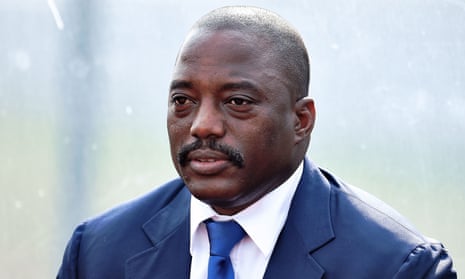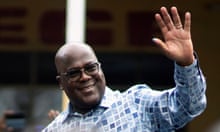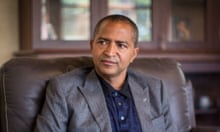Critics of the Democratic Republic of the Congo’s president, Joseph Kabila, fear his attempts to cling to power could lead to widespread violence after a key opposition leader was charged with plotting a coup d’état this week.
Political tensions in the country escalated when Moïse Katumbi, a provincial powerbroker and former close ally of the president, was charged hours after announcing he would run for president in elections scheduled for later in the year.
Critics accuse Kabila, in power since 2001, of manoeuvring to delay the vote and remain in office beyond his constitutionally permitted two terms.
Kabila had “deliberately sabotaged the electoral process” and instituted a “policy of chaos and fear”, said Olivier Kamitatu Etsu, a member of Congo’s national assembly and a former minister of planning.
The Obama administration has threatened to impose sanctions on anyone who undermines security and democracy in the DRC and the latest charges are likely to concern Washington.
The country is Africa’s largest copper producer and western mining companies have invested heavily there since a 2003 peace agreement ended years of conflict that drew in more than six neighbouring countries and may have killed millions.
A delegation of Kabila’s political opponents traveled to Washington earlier this week to urge the US to act quickly against him and his top aides.
Sanctions could include the freezing of assets and a travel ban. But the warning has so far failed to sway Kabila and members of his government. The DRC’s ambassador to the US, François Balumuene, denied the charge and said Kabila was committed to holding fair and peaceful elections.
Balumuene said it was impossible for the president to change the constitution to stay in power. He insisted that logistical and financial problems had to be resolved before any polls.
The threat of sanctions has provoked an angry response from Kabila loyalists. Henri Mova Sakani, the secretary general of the president’s party, accused western powers of trying to divide the DRC to tryto restore colonialism.
“You can come up with anything you like – sanctions or whatever. You won’t scare us,” he told crowds gathered on Tuesday to mark the 1997 overthrow of the autocrat Mobutu Sese Seko by Kabila’s father.
Some analysts fear a violent showdown, pitting Kabila against Katumbi, a former governor of Katanga province in the south-east and the owner of Africa’s top football team, TP Mazembe.

Last week, police fired tear gas at Katumbi and thousands of his supporters in Lubumbashi, the DRC’s second city and a bastion of the opposition.
The country’s highest court ruled a week ago that Kabila would stay in power until elections could be held. Leading opposition parties say the ruling is part of a “constitutional coup d’état” and have called for nationwide marches on 26 May to demand Kabila steps down this year.
But Kabila allies won more than two-thirds of the elections for governors of newly created provinces in March, shoring up local control of security forces and patronage networks.
Hans Hoebeke, International Crisis Group’s senior Congo analyst, said: “Cohesion in the Kabila camp has been maintained these last months. At this stage there is little to no pressure on him.”
Whereas the neighbouring strongmen Denis Sassou Nguesso in Congo-Brazzaville and Paul Kagame in Rwanda have easily pushed through constitutional changes to allow them to stand for third terms, Kabila has been unable to take such a blunt approach.
Ben Shepherd, an analyst at Chatham House, said the moves against Katumbi were part of a struggle by the rival politicians to win the confidence of members of Congo’s “interlocking, self-interested elite”.
“There is a sense that the presidency is weak. Kabila hasn’t managed to get a third term rubber-stamped and a new deal is possible. Currently no one wants to commit to either side so momentum is extremely important. If one candidate could attract support it could snowball,” Shepherd said.
He also downplayed the possibility of widespread violence. “I don’t think there will be anything remotely resembling peace and order in the DRC but I don’t think anyone is ready to light the blue touch paper either,” he said.
Millions have died from conflict, hunger and disease since Kabila’s father, Laurent Kabila, overthrew Mobutu. Despite the presence of nearly 20,000 UN peacekeepers, the country’s east remains ravaged by armed groups. In January 2015, dozens died in protests against proposed changes to the election law that could have delayed the poll by years.
Opposition parties have struggled to mobilise supporters for street rallies, but that may change with the multimillionaire Katumbi, who resigned from running the mineral-rich Katanga in September, accusing Kabila’s allies of plotting to keep the president in power.
“Our future president is Moïse Katumbi whether Kabila likes it or not,” said Pierre Nyembo Muyeye outside the prosecutor’s office in Lubumbashi. Some Katumbi partisans threatened to burn down the entire city if he was arrested.
Known during his governorship for distributing $100 bills to the public, Katumbi has been keen to present himself as the face of the people against a predatory state. “The greatest army in the world is the people,” he often says.
“The government fears him because he has the potential to mobilise an electorate in different parts of the country,” said Kris Berwouts, an independent Congo analyst. “There is an aura of success around him.”
The government denies Katumbi’s allegation that the coup plot charges against him are politically motivated.
Katumbi, though nominated by seven opposition parties to be their presidential candidate, faces an uphill battle to unify a historically fractured opposition.
The result has been a stalemate, said Jason Stearns, the director of the Congo Research Group at New York University. “Delaying tactics will work for a certain amount of time and buy him months, maybe several more years in power,” he said. “But it’s not a long-term strategy.”
The DRC is nearly two-thirds the size of western Europe and has a population of more than 79 million. Since it won independence from Belgium in 1960, there has never been a peaceful, democratic transition of power in the country.
Observers differ over the potential for widespread conflict. Its sprawling borders reach nine other African countries, and an implosion in the vast nation could spark instability in its neighbours, some maintain.
Others say that regional powers have little interest in sparking a violent battle to exploit the country’s resources. “The kind of proxy wars which were a feature before are possible, but not likely. It’s hard to see who would do it or why,” said Shepherd, of Chatham House.
Kabila took office less than two weeks after his father was shot by a bodyguard in the presidential palace in 2001. He was elected president in disputed polls in 2006 and again in 2011.
“It’s a really dicey situation,” said Senator John McCain, one of several US lawmakers who have sought to draw greater attention to problems in the country. McCain last month wrote to the DRC’s ambassador in Washington, telling him that the advocacy group Human Rights Watch has documented dozens of cases of arbitrary arrest and unlawful detention.











Comments (…)
Sign in or create your Guardian account to join the discussion